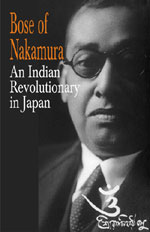
Bose of Nakamuraya
An Indian Revolutionary in Japan
Original book in Japanese by Takeshi Nakajima
English translation by Prem Motwani
2009, Hb, 323pp., Biblio., Index
ISBN-10: 818500983
ISBN-13: 9788185002989
Publisher: Promilla / BSA
Price: ₹ 700.00
(Outside India: US $35.95)
 With the kind support of The Japan Foundation, New Delhi
With the kind support of The Japan Foundation, New Delhi

The Book
Rash Bihari Bose (1886-1945) was a revolutionary leader against the British in India and was one of the key organizers of the bomb attack on Lord Hardinge and the Gadar Conspiracy at Lahore. He fled to Japan to avoid a certain death sentence and spent the latter half of his life there. He became close to the right wing nationalists in Japan and was intsrumental in almost persuading the Japanese authorities to support the Indian freedom struggle. He did the spadework for the creation of the Indian National Army (INA) before passing the baton on to Subhash Chandra Bose towards the end of his life.
While the post-war generation of Japanese may not know of Rash Bihari Bose, he was a well-known figure in Japan in the years before the Second World War, where he was actively trying to secure foreign help for Asia's liberation from the clutches of imperialist powers, and a regular writer on Indian affairs in Japanese newspapers and magazines of the time.
Nakamuraya in Shinjuku, Tokyo, famous for its Indian curry, was the place where Rash Bihari was provided shelter for over three months by his Japanese well-wishers, defying the deportation order against him by the Japanese government. Very few people are aware that Rash Bihari Bose was instrumental in introducing authentic Indian curry to the Japanese.
Pre-war Japan has enamoured researchers the world over for obvious reasons. However, the Japanese language has been the stumbling block as very little literature of this era, especially written by the Japanese themselves, is available in English. Besides presenting a nail-biting account of Rash Bihari's travails, torn betwen his anti-colonialist stance and his allegiance to the Japanese Asianists for saving his life, which has been totally unknown till date, it provides a rare insight into Japan's expansionism in Asia viewed from the Japanese angle.
This book is a must-read for those interested in Japan's policy towards Asia, particularly in China, Korea, South East Asia and India between 1920 and 1945.
The Author / The Translator
TAKESHI NAKAJIMA was born in Osaka, Japan, in 1975. He graduated from the Osaka University of Foreign Studies specializing in Hindi and went on to complete his Ph.D from the Kyoto University. He received the Third Asia-Pacific Research Award for his doctoral thesis and won the prestigious Osaragi Jiro Rondan Award, given by the Asahi Shimbun for this book for 2005. Takeshi Nakajima has also authored Hindu Nationalism, Chûô Shinsho Pub., 2002. Nakjima is, currently working as associate professor at the Hokkaido University Public Policy School (HOPS).
The Translator:
Professor of Japanese at the Jawaharlal Nehru University, New Delhi, Prem Motwani studied at the Tokyo University and carried out pioneering research on the Japanese lexicon at the prestigious National Language Research Institute. He has published two dictionaries from Maruzen, Tokyo, authored two books on India in Japanese and translated about ten books from Japanese into English.